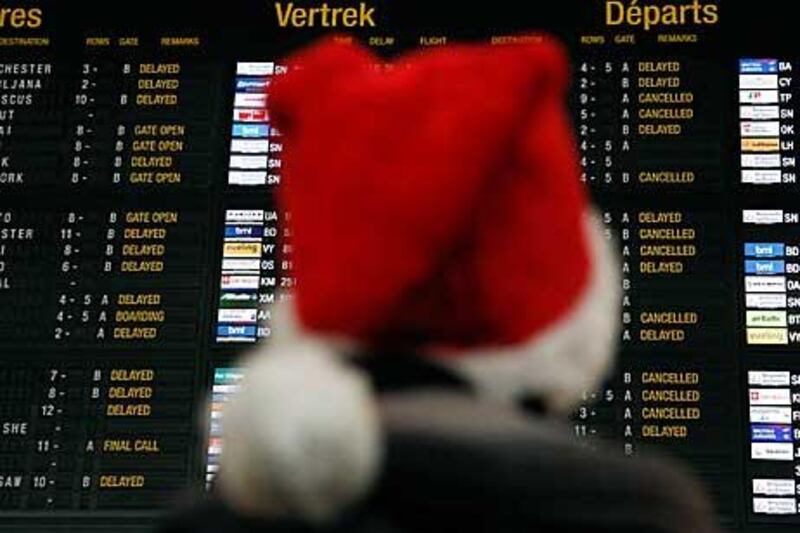Exceptionally cold weather and heavy snowfall have caused travel chaos for airlines in Europe, but analysts say the disruptions will not mar a positive outlook for the airline sector if corporate travel increases next year as expected.
The impact of the weather in recent days is considered a short-term, "one-off event"that should not affect investment ratings, said Tony Shepard, an analyst at Charles Stanley. Analysts have compared the disruption to that caused by a volcanic ash cloud this year. That period of flight disruptions hit market sentiment in the short term but had no lasting impact.
Recently, thousands of travellers have been stranded at European airports as snow-clogged runways and shortages of de-icing equipment and fluid led to cancelled or delayed flights.
Paris's Charles de Gaulle airport, Europe's second-busiest, cut the number of flights by 35 per cent on Christmas Eve because of a shortage of the antifreeze used to remove ice from aircraft wings and fuselages, and has forecast more bad weather. About 2,000 people were forced to spend Thursday night at the two main airports in Paris as snowfall in the north and east of France continued to disrupt transport services.
"I can't remember the weather being this bad in December," said Jan Van der Cruysse, a spokesman for Brussels airport. The airport prepared hundreds of beds for stranded passengers over Christmas after it reopened to inbound flights following a day of delays and cancellations.
Friday's disruptions came after chaos earlier in the week, when tens of thousands of travellers were stranded across Europe as delays and cancellations of flights and high-speed trains were compounded by weather-related restrictions on road travel.
When the weather clears, however, airlines can look forward to a year of increased demand.
The more profitable business segment of air travel is rising again, as economies emerge from recession.
"It's really about the premium business traffic. It's linked to the strength of the corporate sector, and the pick-up in world trade growth, which is continuing," said Richard Batty, a strategist at Standard Life Investments in Edinburgh.
Revenue at Air France-KLM is forecast to rise to €27.2 billion (Dh131.05bn) for the year to March 2012, up 11 per cent on the year to March this year, according to Credit Suisse estimates, largely because of a rise in premium traffic. Analysts say airlines' costs will not rise as much as turnover because revenue per unit of traffic tends to be higher for business travel, even with budget airlines.
Overall passenger traffic for most airlines in recent months is up on a year ago, reversing a trend earlier in the year, according to the airlines' own figures. On average, more seats are being filled, boosting operating margins, analysts say.
The International Air Transport Association said this month that the number of passengers travelling in premium seats - first and business class - was 10.9 per cent higher in October than in the same month a year earlier.
It also said the world's airlines would return to profit this year and next at higher levels than previously expected because of an upturn in the market and better use of their capacity.
"The airlines did a good job on restructuring [through the downturn]", said Stephen Furlong, an analyst at Davy Research, who has an "outperform" rating on the sector.
Even a projected rise in oil prices next year, currently hovering at about US$90 per barrel, may not have a major impact.
Analysts say that if oil price rises are linked to economic growth, rises in fares and traffic will more than compensate. And any surprise moves in the oil price are being managed by airlines hedging their requirements. "If the oil price is higher, that will be reflected in the fares as well," said Gert Zonneveld, an analyst at Panmure Gordon.
* with Agencies





